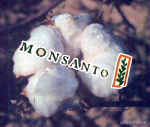GMO news related to India
09.01.2015 | permalink

Organic Farming Points the Way to Sustainable Agriculture
NAGAPATNAM, India, Jan 7 2015 (IPS) - Standing amidst his lush green paddy fields in Nagapatnam, a coastal district in the southern Indian state of Tamil Nadu, a farmer named Ramajayam remembers how a single wave changed his entire life.
The simple farmer was one of thousands whose agricultural lands were destroyed by the 2004 Asian tsunami, as massive volumes of saltwater and metre-high piles of sea slush inundated these fertile fields in the aftermath of the disaster.
(.....) “The general perception is that organic farming takes years to yield good results and revenue,” TOFarM’s Revathi told IPS.
“But during post-tsunami rehabilitation work, with data, we proved that in less than a year organic methods could yield better results than chemical farming. That TOFarM was invited to replicate this in Indonesia and Sri Lanka is proof that farms can be revived through sustainable practices even after disasters,” she added.
As early as 2006, farmers like Ramajayam, having planted a salt-resistant strain of rice known as kuzhivedichan, yielded a harvest within three months of the sowing season.
Together with restoration of some 2,000 ponds by TOFarM, farmers in Nagapatnam are confident that sustainable agriculture will stand the test of time, and whatever climate-related challenges are coming their way. The lush fields of Tamil Nadu’s coast stand as proof of their assertion.
06.01.2015 | permalink
India: Environment Minister Prakash Javadekar Bats for GM Crop Trials
The Narendra Modi government is committed to going ahead with trials for genetically modified or GM crops and a decision on commercialization will be taken only after proper scientific evaluation, Environment Minister Prakash Javadekar has told NDTV.
29.12.2014 | permalink
India: Govt set to import cotton seeds despite ban
The federal government is opening doors for introducing various varieties of cotton seeds produced by foreign firms despite a ban on their import.
16.12.2014 | permalink
Seeds of Truth: Vandana Shiva and the New Yorker
A response to the article ‘Seeds of Doubt’ by Michael Specter in The New Yorker.
02.12.2014 | permalink
India: Govt may ignore pressure and back GM-crop field trials
Certain states may have reservations against Genetically Modified (GM) crops, but the Centre has backed field trials of such varieties in "national interest" and even asked investors to look at the potential of transgenic seeds-driven business opportunities in India.
26.11.2014 | permalink
India: No ban on GM crop field trials, says envi minister Javadekar
There is no ban on GM crop field trials either by the government or the Supreme Court, environment minister Prakash Javadekar said on Wednesday.
24.11.2014 | permalink

Rising suicide rate for Indian farmers blamed on GMO seeds
Monsanto, which has just paid out $2.4 million to US farmers, settling one of many lawsuits it’s been involved in worldwide, is also facing accusations that its seeds are to blame for a spike in suicides by India farmers.
The accusations have not transformed into legal action so far, but criticism of Monsanto has been mounting, blaming the giant company for contributing to over 290,000 suicides by Indian farmers over the last 20 years.
The author of a documentary on Indian farmers’ suicides, Alakananda Nag, who has interviewed dozens of the relatives of those who have taken their lives, links the rise in the suicide rate to the use of GMO seeds. She believes small farms are particularly vulnerable.
“The large farms certainly have the funds to support themselves and get on, but the smaller ones are really ones that suffer the most,” Nag told RT. “Monsanto definitely has a very big hand to play. A few years ago it was illegal to grow GMO crops in India. It’s not like the suicide did not exist back then. It did, but I think there was definitely a sharp rise in the [suicide] numbers once [GMOs] were allowed.”
The Center for Human Rights and Global Justice has estimated that in 2009 alone 17,638 Indian farmers committed suicide, or one suicide every 30 minutes.
Farmers’ widows, such as Savithri Devi from India’s southern state of Telangana, explain just how tough things can get for those trying to grow enough crops to earn a living.
“[My husband] initially put a bore well, then started cultivation, but we didn’t get enough water from the bore well and there were no rains, too,” Devi told RT. “So he again tried to deepen the bore well, but it didn’t work. So he borrowed money. His depression eventually led him to committing suicide. He drank pesticide and died.”
The legalization of GMO in 2002 has only added to the stress experienced by Indian farmers, according to the head of the Council for Responsible Genetics, Sheldon Krimsky.
- Rising suicide rate for Indian farmers blamed on GMO seeds
- Farmer Suicides in India | CHRGJ
- Monsanto BT Cotton and Indian Farmers - Vandana Shiva - How Monsanto Destroys Farming - YouTube
- From Seeds of Suicide to Seeds of Hope: Why Are Indian Farmers Committing Suicide and How Can We Stop This Tragedy? | Vandana Shiva
- Council for Responsible Genetics: GeneWatchVolume 26 Issue 1 Genetics in Agriculture
- Picking Cotton: The choice between organic and genetically-engineered cotton for farmers in South India | Greenpeace India
20.11.2014 | permalink
Monsanto uses Indian farmers to contaminate world with GMO crops
By persuading Indian farmers to buy genetically modified organism (GMO) seeds Monsanto spreads its genetically engineered crops around the world so that no one can compete with pure non-GMO products after that, anti-GMO activist Jeffrey Smith, told RT.
03.11.2014 | permalink
India: Activists oppose GM maize trials in Maharashtra
The Coalition for a GM-Free India, a group of about 400 organisations, has sought an explanation from the Mahatma Phule Krishi Vidyapeeth at Rahuri on why it is conducting controversial open field trials of genetically modified corn on its campus.
28.10.2014 | permalink
India: Govt allows field trials for GM mustard, brinjal
The environment ministry has allowed field trials of two varieties of genetically modified (GM) brinjal and mustard, almost 18 months after the previous government ordered a freeze on such tests
